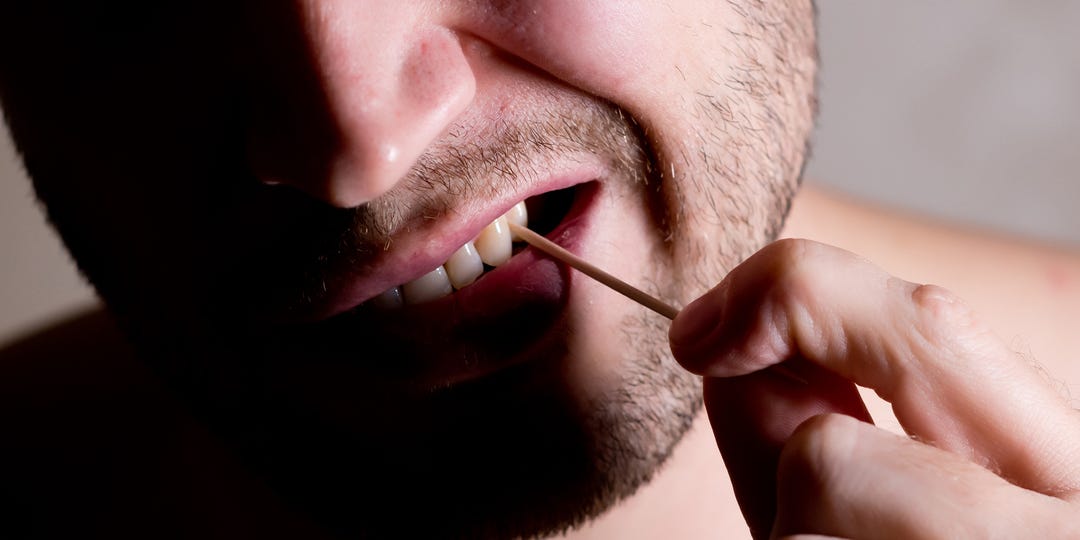
Vyacheslav Dumchev/Getty Images
- Hard wooden toothpicks are not ideal for cleaning teeth because they can cause gum damage that could lead to infection.
- Rough and frequent toothpick use can damage existing dental work like fillings or veneers.
- Toothpicks can also break, splinter, and get lodged in your gums.
- Visit Insider’s Health Reference library for more advice.
While toothpicks are handy and convenient, they may not be the most logical or safe choice when trying to get food out of your teeth.
Here’s what you need to know about the risks of using toothpicks, as well as safer, dentist-approved methods of food removal.
The dental risks of using toothpicks
Using toothpicks doesn’t come without risks. The toothpick can break, introduce bacteria to your gums, and damage dental work.
Here’s why toothpicks may not be the best for your oral health:
Toothpicks can break and get stuck in your gums. A toothpick might break if it’s poorly made or if you’re using it too harshly. Broken or wedged toothpicks can lead to inflammation of your gums, particularly if it can’t be removed as soon as possible.
"If you are unable to remove the broken piece, you can cause more issues trying to do so by further lacerating the tissues and causing more inflammation or potential infection, which can be dangerous and painful," says Cheryline Pezzullo, DDS, assistant director of community-based programs and clinical assistant professor at NYU College of Dentistry.
You may be able to carefully remove a broken toothpick by looking in a mirror or asking a friend for help. But if broken pieces are particularly stuck, you may need to see a dentist or hygienist to properly and safely remove them.
Toothpicks may cause infections. The pointy end of a toothpick makes it easy to puncture your gums or accidentally cut your mouth. This can create an open wound that is vulnerable to infection-causing bacteria.
Pezzullo says this bacteria may come from anywhere, including the surface of the toothpick itself, depending on if it was stored in a clean manner.
Toothpicks can damage dental work. Toothpicks may compromise dental work like fillings and veneers. "If there is any issue or gap in an existing dental restoration, it can be greatly exacerbated by the use of toothpicks - which can lead to loosening, fracturing, or even loss of these restorations," says Pezzullo.
This is because if there's a gap in the restoration that the toothpick could fit in, the toothpick can widen the gap or cause the restoration to fall out. Pezzullo says that restoration materials such as filling material are not as strong as the natural tooth, which means it can be more easily broken.
What to use instead of toothpicks for your teeth
There are a few dentist-approved methods of getting food out of your teeth that are safer and more effective than using a toothpick. Pezzullo recommends using:
- Dental floss (particularly waxed flat floss)
- Plastic handled floss sticks
- A Waterpik, which uses a high-pressure water stream to dislodge food and other particles
"These options are much better than toothpicks because it is very difficult to break them in a way that could damage the surrounding teeth or gums," says Pezzullo. "The use of soft floss or water is gentle and generally would not lacerate gum tissue, thus avoiding infection or inflammation."
It may be helpful to carry around some of these options with you when you go out to eat so you have them readily available and won't need to reach for a toothpick.
Insider's takeaway
When it comes down to it, the risks outweigh the benefits of using toothpicks. In cases like these, it's always better to be safe than sorry and to listen to your dentist's advice. Instead of springing for a toothpick, use one of the dentist-approved methods for the best oral hygiene.
Related stories from Health Reference:
- 8 tips to help you stop grinding your teeth
- Does baking soda whiten teeth? It can, but toothpaste is a better option - here's why
- How to whiten your teeth naturally, with at-home methods
- Is chewing ice bad for your teeth? Yes, it can damage tooth enamel
- Four home remedies to get rid of a toothache when you can't see a dentist